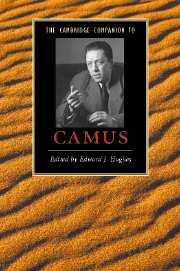Book contents
- Frontmatter
- Introduction
- PART I: BIOGRAPHY AND INFLUENCES
- PART II: THEMES, PREOCCUPATIONS AND GENRES
- 4 Rethinking the Absurd: Le Mythe de Sisyph
- 5 Camus and the theatre
- 6 Camus the journalist
- 7 Camus and social justice
- 8 Violence and ethics in Camus
- 9 Camus and Sartre: the great quarrel
- 10 Portraits of women, visions of Algeria
- PART III: TEXTS AND CONTEXTS
- Postface
- Guide to Further reading
- Index
- Series List
6 - Camus the journalist
from PART II: - THEMES, PREOCCUPATIONS AND GENRES
Published online by Cambridge University Press: 28 September 2007
- Frontmatter
- Introduction
- PART I: BIOGRAPHY AND INFLUENCES
- PART II: THEMES, PREOCCUPATIONS AND GENRES
- 4 Rethinking the Absurd: Le Mythe de Sisyph
- 5 Camus and the theatre
- 6 Camus the journalist
- 7 Camus and social justice
- 8 Violence and ethics in Camus
- 9 Camus and Sartre: the great quarrel
- 10 Portraits of women, visions of Algeria
- PART III: TEXTS AND CONTEXTS
- Postface
- Guide to Further reading
- Index
- Series List
Summary
From an early age Camus had wanted to write yet it was not by choice that he became a journalist. His tuberculosis meant that he could not be a teacher and so he had to find some other pathway. He does not appear to have considered using his experience as an actor and producer to turn professional. He was by turns editorial secretary, reporter, leader writer and editor-inchief. Camus did not like to claim to be an 'intellectual' or a 'philosopher'. He called himself an 'artist', a 'witness', occasionally a 'professional journalist'. He once admitted that he felt that journalism was 'une des plus belles professions que je connaisse' (Ess, 1565) ('one of the finest professions that I can think of'). His friend Jean Daniel added that for Camus, journalism was not an exile but a kingdom, something in which he felt at home. Yet it was Camus's literary successes that were to preserve the record of his journalistic achievements. If he had not written L'Etranger, La Peste and Caligula, then Actuelles would certainly not exist as a book. Who, apart from the odd historian, would ever have heard of an obscure reporter for Alger républicain? The leader writer for Combat would have been about as well known as fellow journalists on the paper such as Marcel Gimont and Georges Altschuler. L'Express would not have tried to sign him up.
- Type
- Chapter
- Information
- The Cambridge Companion to Camus , pp. 79 - 92Publisher: Cambridge University PressPrint publication year: 2007
- 2
- Cited by

